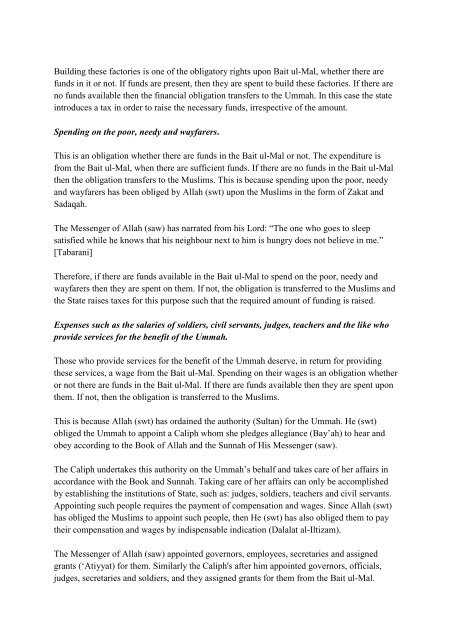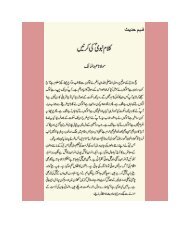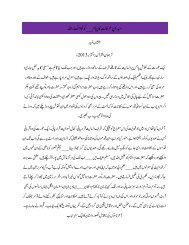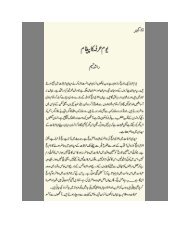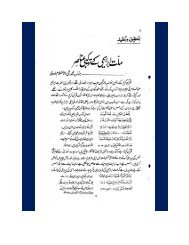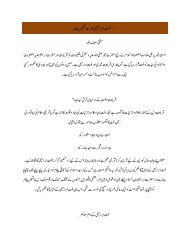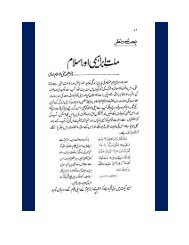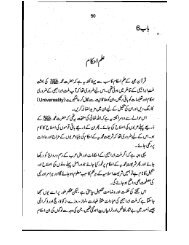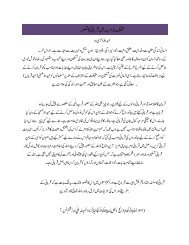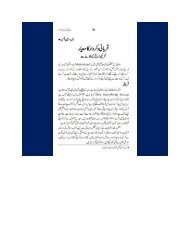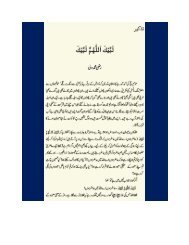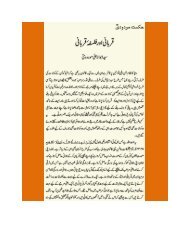Islam_Tax
Create successful ePaper yourself
Turn your PDF publications into a flip-book with our unique Google optimized e-Paper software.
Building these factories is one of the obligatory rights upon Bait ul-Mal, whether there are<br />
funds in it or not. If funds are present, then they are spent to build these factories. If there are<br />
no funds available then the financial obligation transfers to the Ummah. In this case the state<br />
introduces a tax in order to raise the necessary funds, irrespective of the amount.<br />
Spending on the poor, needy and wayfarers.<br />
This is an obligation whether there are funds in the Bait ul-Mal or not. The expenditure is<br />
from the Bait ul-Mal, when there are sufficient funds. If there are no funds in the Bait ul-Mal<br />
then the obligation transfers to the Muslims. This is because spending upon the poor, needy<br />
and wayfarers has been obliged by Allah (swt) upon the Muslims in the form of Zakat and<br />
Sadaqah.<br />
The Messenger of Allah (saw) has narrated from his Lord: “The one who goes to sleep<br />
satisfied while he knows that his neighbour next to him is hungry does not believe in me.”<br />
[Tabarani]<br />
Therefore, if there are funds available in the Bait ul-Mal to spend on the poor, needy and<br />
wayfarers then they are spent on them. If not, the obligation is transferred to the Muslims and<br />
the State raises taxes for this purpose such that the required amount of funding is raised.<br />
Expenses such as the salaries of soldiers, civil servants, judges, teachers and the like who<br />
provide services for the benefit of the Ummah.<br />
Those who provide services for the benefit of the Ummah deserve, in return for providing<br />
these services, a wage from the Bait ul-Mal. Spending on their wages is an obligation whether<br />
or not there are funds in the Bait ul-Mal. If there are funds available then they are spent upon<br />
them. If not, then the obligation is transferred to the Muslims.<br />
This is because Allah (swt) has ordained the authority (Sultan) for the Ummah. He (swt)<br />
obliged the Ummah to appoint a Caliph whom she pledges allegiance (Bay’ah) to hear and<br />
obey according to the Book of Allah and the Sunnah of His Messenger (saw).<br />
The Caliph undertakes this authority on the Ummah’s behalf and takes care of her affairs in<br />
accordance with the Book and Sunnah. Taking care of her affairs can only be accomplished<br />
by establishing the institutions of State, such as: judges, soldiers, teachers and civil servants.<br />
Appointing such people requires the payment of compensation and wages. Since Allah (swt)<br />
has obliged the Muslims to appoint such people, then He (swt) has also obliged them to pay<br />
their compensation and wages by indispensable indication (Dalalat al-Iltizam).<br />
The Messenger of Allah (saw) appointed governors, employees, secretaries and assigned<br />
grants (‘Atiyyat) for them. Similarly the Caliph's after him appointed governors, officials,<br />
judges, secretaries and soldiers, and they assigned grants for them from the Bait ul-Mal.


